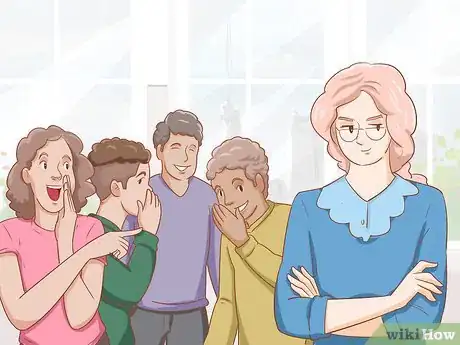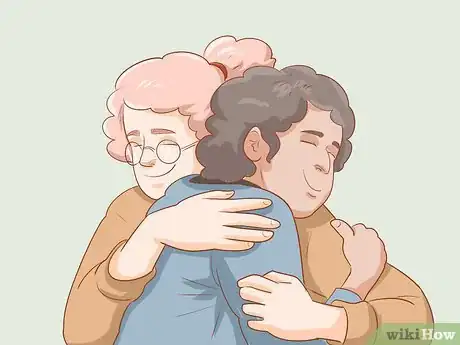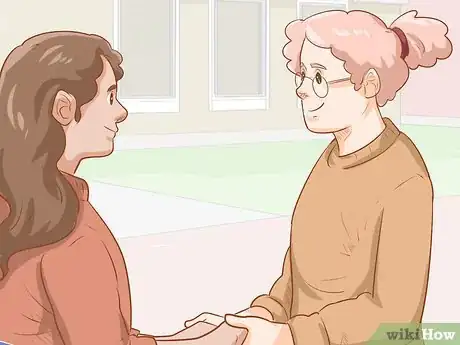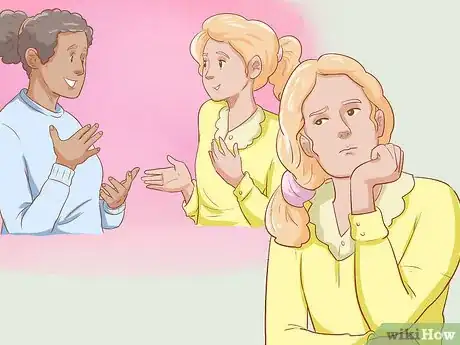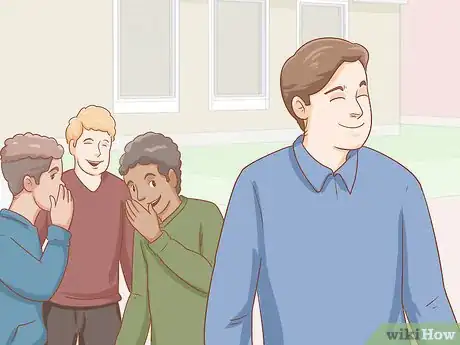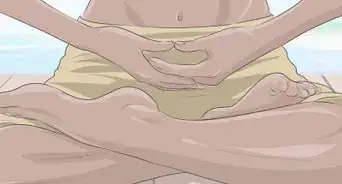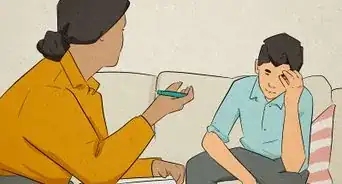This article was co-authored by Philip Glickman, PsyD and by wikiHow staff writer, Danielle Blinka, MA, MPA. Dr. Philip Glickman is a Licensed Clinical Psychologist and the Director of Wellness Road Psychology with two locations in Dobbs Ferry and the Financial District of New York City. He specializes in cognitive-behavioral therapy, mindfulness techniques, treatment of anxiety, and life coaching. Dr. Glickman is a member of the American Psychological Association. He holds a BA in Criminology and Psychology from The University of Maryland College Park and an MA in Forensic Psychology from The City University of New York. Dr. Glickman also holds a PsyD in School and Community Psychology from Hofstra University.
There are 10 references cited in this article, which can be found at the bottom of the page.
This article has been viewed 45,189 times.
Being humiliated in front of your crush is a terrible feeling, but it will get better. Try to remember that your crush probably doesn’t realize you’re embarrassed. If the humiliation is recent, focus on dealing with your feelings. Additionally, it’s helpful to confront your feelings so you can move past the incident.
Steps
Coping in the Moment
-
1Go somewhere private to calm down, if necessary. Being humiliated hurts, so it’s understandable if you’re feeling upset. If you can, go to the restroom or step outside so you calm yourself down. Take slow, deep breaths to help your body relax. Additionally, go ahead and cry if you need to.[1]
- If you can’t leave, focus on your phone or hide your face in a book. Try to block out what’s going on around you. Then, breathe deeply to help yourself relax.
-
2Focus your attention on something calming if you can't leave. Sometimes it's not so easy to walk away, so use distraction to help you block out what's happening. The best distraction is doing something, such as talking to a friend, sorting your school work, or writing something down. However, you can also think about something to distract yourself. Try one of the following distractions:[2]
- Talking to a friend
- Thinking about a positive memory
- Looking at funny memes
- Looking at a painting or poster
- Thinking about the last episode of your favorite comedy
Advertisement -
3Count your breaths to help you avoid crying. If you feel like you're about to cry, focusing on your breathing can help you quickly relax yourself. Take slow, deep breaths, counting on each inhale.[3] Keep counting your breaths until you start to feel calm.[4]
- As another option, count to 5 on your inhale, then hold your breath for 5 seconds. Finally, exhale for a 5 count. Repeat 5 times to help relax your body.
-
4Talk to someone you trust about how you feel. Venting about the incident can help you feel better. Tell a close friend or trusted adult about what happened and how you feel. Then, let them know if you want advice or not.[5]
- You might say, “My feelings are really hurt because a girl at school embarrassed me in front of my crush. Now I’m worried that my chances of dating them are ruined. Plus, I feel like people are laughing at me. What should I do?”
Variation: If you don’t want to talk to anyone, try writing your feelings down in a letter. After you write the letter, burn it or tear it up.
-
5Avoid hiding from people because of the incident. Feeling humiliated can make you want to disappear or run away, but this won’t help you feel any better. Additionally, it might make people more aware that you’re feeling embarrassed. As soon as you’re feeling calm, rejoin your classmates and try to act like nothing happened. If you do, people will probably forget the incident soon.[6]
- Try to remember that everyone is focused on what they’re doing, so it’s likely that no one realizes how embarrassed you are.
- If and when someone brings up the incident, you should not only try to ignore them, but also learn to laugh at yourself. People who are able to handle humiliation with stride seem more mature, elegant, and nonchalant. It'll not only do wonders for your popularity, but it'll help yourself recover from the awkwardness faster.
-
6Engage in an activity you enjoy to improve your mood. While your feelings are important, don’t let this experience ruin your day. Instead, do something that makes you happy. If you can, invite your friends to join you.[7]
- If you’re at school, you might doodle in your notes, talk to your friend, or ask to visit the library.
- If you’re at a party, you could ask your friends to dance with you, start a game, or ask your friends to take silly selfies with you.
- If you’re at home, watch your favorite show, make something, or go for a walk.[8]
Dealing with Your Emotions
-
1Let yourself feel your emotions without judging yourself. It’s okay if you’re feeling upset, hurt, angry, or sad. You have every right to feel that way. Don’t try to force your feelings to go away. Instead, acknowledge how you feel because it will help you feel better faster.[9]
- Say to yourself, “I’m feeling really angry because Amy is supposed to be my friend,” or “I’m feeling sad because I’m worried Alex won’t like me now.”
Did You Know? Giving yourself permission to feel your emotions allows you to move past them, so you’ll feel better faster.
-
2Tell yourself what you'd say to a friend. You’re likely much harder on yourself than you are on others, so it helps to consider what you’d say to a friend. Imagine that your friend was just humiliated like you were. Then, think about how you would feel about it and how you’d comfort them.[10]
- You’d probably say something like, “I can’t believe that just happened to you! Trust me, we’re all on your side,” or “I’m sorry that just happened. I’m here for you if you need to talk.”
-
3Write about your feelings in a journal to help you process them. Use your journal, a notebook, or a word processor to record what happened and how you're feeling.[11] Try to name your emotions and why this experience made you feel that way. Then, try to view the incident from a different perspective to help you understand how other people might view it.[12]
- If you're still feeling upset after journaling, come back to it again the next day to write some more. This should help you start to feel better about the situation.
-
4Think about how important this will be in 5 years. Chances are, whatever happened won't matter in 5 years. Picture yourself in the future living your best life. Then, ask yourself if this humiliating moment really matters.[13]
- For example, falling down at a middle school dance can feel like the worst thing that ever happened, but it won't matter in a few years.
-
5Turn what happened into a funny story you can tell. You probably already have funny stories about embarrassing experiences in your past. Maybe this experience will be your next story! Imagine yourself in the future telling this story at a party. Then, try to laugh about what happened.[14]
- Some experiences just aren’t funny at all, so don’t feel like you have to laugh about it if you’re really hurting. However, most embarrassing moments make great funny stories.
-
6Ask others about times they were embarrassed so you don't feel alone. While you might feel alone right now, everyone gets humiliated at some point. Talking to others about their embarrassing moments might help you realize you aren’t alone. Ask people to share their most embarrassing stories, as well as how they felt at the time. Then, question how they feel about the incident now.[15]
- Say, “What was your most humiliating moment?” or “Did you ever embarrass yourself in front of your crush?”
Variation: You can also read embarrassing stories online, including stories from other people who were humiliated in front of their crush.
-
7Recognize the motivation of the person who humiliated you. If someone else humiliated you, it helps to consider why they did it. Most likely, they did it for a personal reason that has nothing to do with you. Think about what was going on at the time of the incident and how this person typically treats others. Additionally, consider what’s happened between you in the past.[16]
- Try to remember that their decision to hurt you shows who they are, not who you are. Don’t let their bad decision to humiliate you weigh you down.
Moving past Your Embarrassment
-
1Forgive yourself if you feel like you made a mistake. Everybody makes mistakes, and that’s a good thing. Mistakes help you learn and grow so you can become the person you’re supposed to be. Tell yourself that you’re forgiven for what happened. Then, give yourself permission to make more mistakes in the future.[17]
- Tell yourself, “I forgive myself for spilling my lunch on my crush,” or “I know that everyone makes mistakes, so I forgive myself for getting embarrassed yesterday.”
-
2Focus on your happiness instead of trying to get revenge. Your time is valuable, so don’t spend it trying to get back at people who hurt you. While revenge might sound sweet, it’ll only lead to more hurt feelings. Instead, use your time and energy to make yourself happy. Spend time with your friends, engage in your hobbies, and attend social events.[18]
- If you catch yourself imagining revenge, start a fun activity to distract yourself from the thought. For instance, play a game on your phone, invite a friend over, or play with your pet.
-
3Find the lessons in this experience to help you get over it. Treat this experience as a teaching moment. Think about what you learned from what happened. Additionally, consider how you might use this experience in the future.[19]
- For example, let’s say someone shared a secret you told them. You might decide that you should be more careful about who you trust in the future.
- If you slipped and fell, you might have learned that most people have had a similar experience.
-
4Don't be afraid to face the same situation again. After you humiliate yourself, you might feel nervous about facing the same situation over again. This is especially true if people are laughing about it. However, facing your fear can help you feel better and will eventually make people forget what happened. Keep living your life like you normally would.[20]
- For instance, let's say you slipped in the cafeteria. The next day, your best move is to strut through the cafeteria like nothing happened.
-
5Let go of the "what ifs" so you can move on. You might be playing the incident over-and-over in your head, but this isn't helping. Sure, you probably could have done something differently, but that doesn't matter now. You can't change the past, so focus on today.
- It's always easy to see the different options you had when looking back on something in the past. Don't sweat it!
-
6Talk to the person who humiliated you if you think it will help. You might decide to talk to the person if you’re close to the person or they’ve hurt you more than once. Ask them to talk at a time when you’re feeling calm. Tell them how you feel about what happened and what you hope will change in the future. Then, listen to their side of the story because it’s possible they don’t know they hurt you.[21]
- You might say, “I consider you a close friend, so I was really hurt when you embarrassed me yesterday. I don’t want our friendship to be ruined, so it’s important to me that you not share my secrets.”
Tip: Talk to them in private if you feel comfortable. If you’re too nervous to talk in private, ask them to meet with you and a trusted adult, like the school counselor.
Warnings
- Don’t waste your time trying to get back at the person who hurt you. It’s not worth it!⧼thumbs_response⧽
References
- ↑ https://www.psychologytoday.com/us/blog/living-single/201402/10-steps-getting-over-humiliation
- ↑ https://www.psychologytoday.com/us/blog/fulfillment-any-age/201502/5-ways-get-your-unwanted-emotions-under-control
- ↑ Philip Glickman, PsyD. Licensed Clinical Psychologist. Expert Interview. 19 August 2021.
- ↑ https://www.medicalnewstoday.com/articles/319778.php
- ↑ https://www.psychologytoday.com/us/blog/living-single/201402/10-steps-getting-over-humiliation
- ↑ https://www.psychologytoday.com/us/blog/living-single/201402/10-steps-getting-over-humiliation
- ↑ https://www.psychologytoday.com/us/blog/living-single/201402/10-steps-getting-over-humiliation
- ↑ Philip Glickman, PsyD. Licensed Clinical Psychologist. Expert Interview. 19 August 2021.
- ↑ https://psychcentral.com/blog/5-ways-to-handle-being-humiliated-by-a-loved-one/
- ↑ https://www.psychologytoday.com/us/blog/constructive-wallowing/201804/embarrassed-heres-how-get-over-it-quickly
- ↑ Philip Glickman, PsyD. Licensed Clinical Psychologist. Expert Interview. 19 August 2021.
- ↑ https://psychcentral.com/blog/4-journaling-exercises-to-help-you-manage-your-emotions/
- ↑ https://psychcentral.com/blog/how-to-manage-emotions-more-effectively/
- ↑ https://psychcentral.com/blog/how-to-overcome-embarrassment/
- ↑ https://psychcentral.com/blog/how-to-overcome-embarrassment/
- ↑ https://www.psychologytoday.com/us/blog/the-couch/201710/7-ways-respond-when-someone-shames-you
- ↑ https://www.psychologytoday.com/us/blog/constructive-wallowing/201804/embarrassed-heres-how-get-over-it-quickly
- ↑ https://www.psychologytoday.com/us/blog/living-single/201402/10-steps-getting-over-humiliation
- ↑ https://www.psychologytoday.com/us/blog/living-single/201402/10-steps-getting-over-humiliation
- ↑ https://psychcentral.com/blog/how-to-overcome-embarrassment/
- ↑ https://psychcentral.com/blog/5-ways-to-handle-being-humiliated-by-a-loved-one/

